- About Us
- Columns
- Letters
- Cartoons
- The Udder Limits
- Archives
- Ezy Reading Archive
- 2024 Cud Archives
- 2023 Cud Archives
- 2022 Cud Archives
- 2021 Cud Archives
- 2020 Cud Archives
- 2015-2019
- 2010-2014
- 2004-2009
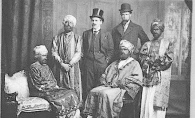 |
The Imitation Of Those Who We Cannot Resemble |
Almost all absurdity of conduct arises from the imitation of those who we cannot resemble. –Samuel Johnson
"Stop fidgeting, everyone ... Jimmy, that'd better not be gum in your mouth! No, Betty you can't go to the bathroom – you should have thought of that before we started ... now you'll just have to wait for the break. Okay, class, today we're going to be discussing possibly one of – if not the -- most important literary figures of the twentieth century: a woman who pretty much single handedly created what we consider to be modern literature..."
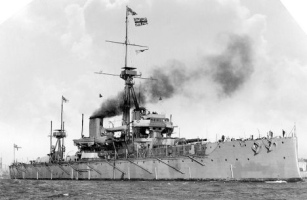
It's quite sad, really, that so many of us have had the juices systematically squeezed out of history, reducing it to nothing but powdery, gagging facts and bland, pasty figures – or, even worse, giants carved in marble, hands on hips, forever steadfastly glaring out at us in the future, their destinies unquestionable.
But, believe me, do some digging and there's juice a plenty in those dusty heroes – and while many of them certainly deserve to 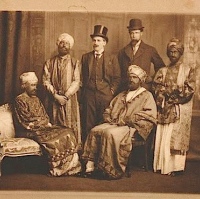 be on their lofty pedestals you'll quickly learn that more than a few of them might be wonderfully, delightfully, fun ... if not totally nuts.
be on their lofty pedestals you'll quickly learn that more than a few of them might be wonderfully, delightfully, fun ... if not totally nuts.
Sarah Bernhardt, for instance, the legendary light of the stage, not only had a wooden leg, liked to sleep in her coffin, but also had quite a few ... involvements, shall we say, with people such as Victor Hugo and Gustavo Doré; Tycho Brahe, one of the brightest stars in astronomy not only had a fake metal nose (having lost his original in a duel) but kept an on-staff dwarf for the entertainment of his guests as well as himself; Richard Feynman, a Nobel Prize to his name, was an notorious humorist and prankster -- as well as quite the established cracksman, even claiming to have once easily got into the safe containing the plans for the first atomic bomb; Georges Simenon, the master French mystery author, not wrote over 200 novels but also claimed to have made love to 10,000 women; and let's not even get started on what M.Christian likes to do with balloon animals...
Which takes us to 1910, back when Britain quite literally ruled the waves: the time of what has been called by many to be the date of the greatest prank in all of history ... and the literary light who had a major part in it.
Now pranks were nothing new, especially for students of Cambridge, but this one – orchestrated by the infamously witty Horace de Vere Cole – set the bar. Horace tried afterward to top himself several times afterward, including infamously dumping horse ... leavings in the canals in Venice (to confuse the non-horse city residents), or arranging a group of bald men to sit in strategic places at the theater so that their domes, when viewed from the balcony, would spell out a rather (ahem) rude word, but his crowning achievement involved the pride of the British Navy, a few of his close friends, some costuming skills, the flag of Zanzibar, and a brilliant degree of planning – all of which rocked the world and nearly got one of them a sentence of ten of the best with a cane.
Horace set the stage with a telegram to the HMS Dreadnought. Now, the Dreadnought wasn't just a battleship, she was the battleship – the flagship of the Navy -- so you'd think that there might have been just a tad amount of skepticism that, according to the message they'd received, the ship would be visited by a gaggle of foreign dignitaries from Abyssinia. 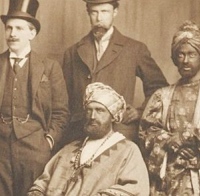
But when a carriage approached the flagship and five rather resplendent figures emerged – with Horace's friend Adrian Stephen acting as official interpreter – the British Navy gave them the Royal treatment ... and then some.
Which is quite amazing when you read that these so-called dignitaries were nothing but five of Horace's friends in elaborate Arabesque costumes, their faces dyed darkly foreign – to the extent that they couldn't eat – and that all of none of them supposedly spoke English, instead relying on Adrian to relay the wonders of the Dreadnought to the group in what everyone was told was their native tongue, but which was actually just some nonsense words and phrases with a smattering of Latin and Greek.
Oh, in case you think the Dreadnought officers were a lone example of atypical British duh, the dignitaries also managed a VIP coach to get them to Portland, where the ship was birthed, by simply using the power of a man in a suit and the 'royal' behavior of the five.
At the Dreadnought, they were met with a honor guard and given a grand tour of the ship and, in appreciation, presented fake honors to some of the drew -- and were even allowed a moment to put down prayer rugs and spend a few moments mumbling prayers to their fictitious Abyssinian gods. As Horace couldn't create a convincing Abyssinian flag or anthem they boldly co-opted the real banner and colors of Zanzibar ... which no one noticed.
In fact no one also noticed that not only was one breaded member of the Abyssinian royal family a woman, but one of the officers of the Dreadnought – who actually knew two of the fake dignitaries – didn't recognize either of them. They didn't even bat and an eye when, at a loss for gibberish or Greek or Latin, the so-called foreign dignitaries would simply chant "Bunga! Bunga!"*
In the end, the officers and crew of the Dreadnought waved farewell to the Abyssinian court, no doubt considering themselves, proudly, to have done their diplomatic duty to Queen and Country with honor and civility.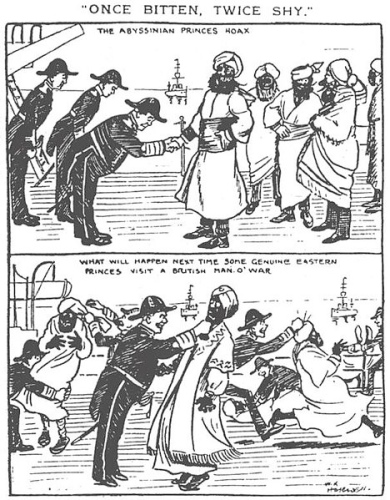
That, more than likely, changed quite (ahem) substantially when the fun was discovered – to which Horace responded by sending a photo of his conspirators to the press. The British government was not amused and the Navy is reported to have even sent two officers to Horace's house to cane him for the affront – to which Horace reported that the Royalty Navy should instead receive the punishment for being so foolish to have fallen for the prank in the first place.
Fun? Absolutely. Brilliant? Without a doubt. In fact, in the annals of hoaxes and humor, the Dreadnought is considered to the one of the highest standards of the art – right up with the antics of Brian G. Hughes, Joey Skaggs, Clifford Irving, and Phineas Taylor (PT) Barnum.
But what makes Dreadnought Hoax really stand out in the world of the whoopie cushion and exploding cigar is not just that a bunch of Cambridge students in blackface, bad costumes, and spouting total and complete gibberish managed to fool the officers and crew of the British Navy's flagship but that one of the members of the hoax would later become "possibly one of – if not the -- most important literary figures of the twentieth century, a woman who pretty much single handedly created what we consider to be modern literature" (to quote myself).
Her novels include Orlando and Mrs. Dalloway, as well as her essay – and writer's Bible -- A Room Of One's Own ... though back in 1910, and in a disguise that included a fake beard you wouldn't have recognized Virginia Woolf as a member of the Abyssinian royal court ... after all, the British Navy couldn't.
#
*Just to show that the British are not without a sense of humor, when the Dreadnought later sank a German submarine during the War To End All Wars (WW1 to everyone else) a telegram of congratulations supposedly said "Bunga! Bunga!"*
M.Christian has published more than 300 published short stories, is the editor of over 20 anthologies - including The Burning Pen, Guilty Pleasures, The Mammoth Book of Future Cops and The Mammoth Book of Tales of the Road (with Maxim Jakubowksi) and Confessions, Garden of Perverse, and Amazons (with Sage Vivant) - and is the author of the collections Dirty Words, Speaking Parts, The Bachelor Machine, Licks & Promises, Filthy, Love Without Gun Control, Rude Mechanicals, and Coming Together: M.Christian; and the novels Running Dry, The Very Bloody Marys, Me2, Brushes, and Painted Doll.
